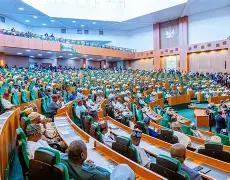A bill seeking the creation of Ibadan State from the present Oyo State has passed its second reading in the House of Representatives, marking a key milestone in one of Nigeria’s longest-standing regional aspirations.
The proposed legislation, sponsored by Abass Adigun, who represents the Ibadan North-East/Ibadan South-East Federal Constituency, seeks to amend the 1999 Constitution to grant Ibadan statehood—an idea rooted in decades of political, cultural, and historical advocacy.
During Thursday’s plenary session, Adigun, while leading the debate, argued that Ibadan’s size, population, and historic significance justify its elevation to state status. He reminded lawmakers that Ibadan, once the capital of the old Western Region, remains one of the largest and most influential cities in Nigeria without its own state.
READ ALSO: Olubadan Tasks Tinubu To Approve Ibadan State Before 2027
“This bill represents a monumental step toward equitable development through federalism and the realization of the long-held aspiration of the people of Ibadan,” Adigun said.
He further noted that “a single local government area in Ibadan is bigger than three local governments in Bayelsa State,” emphasizing the city’s scale and administrative potential.
However, the comparison drew objections from Obuku Ofurji, representing Yenagoa/Opokuma Federal Constituency in Bayelsa State, who described the statement as “irrelevant” and “disrespectful.” Adigun later apologized but maintained that his figures were based on facts.
Presiding over the session, Deputy Speaker Benjamin Kalu referred the bill to the Committee on Constitutional Review for further consideration.
READ ALSO: Creation Of Ibadan State Is My Last Wish— Ladoja
The move comes amid renewed agitation for state creation across various regions of the country, as calls for administrative autonomy and more equitable resource distribution gain momentum.
Just last month, the Olubadan of Ibadanland, Oba Rashidi Ladoja, appealed directly to President Bola Tinubu to ensure the creation of Ibadan State before 2027, describing it as a matter of justice and historical recognition.
Despite the excitement surrounding the bill, the road ahead remains steep. Under Section 8(1) of the 1999 Constitution, the creation of a new state requires a complex approval process, including a two-thirds majority vote in both chambers of the National Assembly.
READ ALSO: Students Protest Renaming Of The Polytechnic Ibadan After Ex-Governor
Also among the process is approval by the House of Assembly of the affected state; endorsement by two-thirds of the local government councils; a referendum supported by two-thirds of the residents in the proposed area; and final ratification by a majority of all Nigerian states.
Deputy Speaker Kalu, who also chairs the House Committee on Constitution Review, stated earlier this year that the ongoing amendment process is expected to conclude by December 2025.
Whether the Ibadan State proposal can navigate the complex legislative path remains uncertain, but for many in the South-West, its passage through the second reading represents a symbolic victory for local identity and regional equity.

